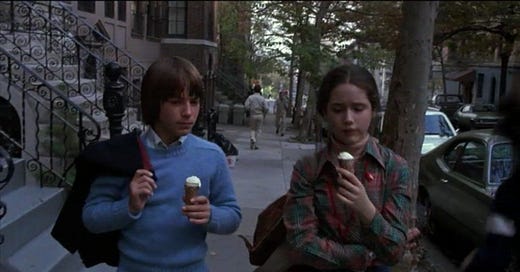Rich Kids essentially argues that if your parents are going to get divorced, it’s best that you’re Upper West Side rich. It’s best that your mom and dad are funny, hot, well-read, crunchy, and so preoccupied with their own dramas that they leave you pretty much on your own to process something that may not actually fuck you up all that much. It’s also best that your living options include a townhouse, another maybe bigger townhouse, or a bachelor pad equipped with exotic birds, a mirror maze, Japanese partitions, and a water bed.
This springy vibe is in stark contrast with another film that came out in 1979— Kramer vs. Kramer. The latter is epic and brutal, and almost functions as a cautionary tale. It seems to say, this is what a disintegrating marriage will look like. These are the reverberations of your unhappiness. Your kid will be in the middle of it all, and this experience will come to define him and all of his future relationships. That’s not to say it isn’t necessary or that the iconic Meryl elevator scene isn’t actually iconic, only that Rich Kids offers a gentler alternative to the harshness. Even if it's approach borders on fantastical.
But Rich Kids, in its own way, is also grounded. It’s just that it chronicles a specific kind of family separation, one where the couples simply grow apart (the wrongdoing is kept to a minimum) and money (who will get it) isn’t all that important. It presents a failing marriage in an almost idyllic, cosmopolitan fashion. The imminent breakup doesn’t birth the expected endless cycle of bitterness and contempt among its characters. Instead, from the chaos, the film invents a naive romance that develops between two confused and hurting kids. As they’re parents discover that they’ve lost themselves in their relationships, these kids begin to probe at what it could look like to share a world with somebody.
There’s 12-year-old Franny, who is precocious and quick to discover that her father, afraid to tell her about his separation, sneaks in every morning pretending to have spent the night. She knows he’s living somewhere else, and as a New York kid who’s inevitably overexposed to a more adult world than most, she’s able to put together that something’s amiss between her parents. She starts to consult with Jamie, the new kid at school, who has a few years on Franny when it comes to navigating his own divorce situation. He mostly lives with his mother, who has since remarried, and has made some sort of rocky peace with seeing his Maserati-driving photographer playboy father every other weekend.
Jamie’s goodnatured, maybe a little over it all, but his insights are delightful. In one of my favorite scenes, he tells Franny the tell-tale signs of an impending divorce. One day soon Franny’s parents will ask to take her out to dinner together. They’ll ask her to pick the restaurant. Then they'll break the news, offer to buy her something, and remind her that they both love her very much. It’s not so much a revelatory procedure, but it’s another instance where Young goes with the whimsical route instead of the trauma narrative.
For a lot of the film, Franny and Jamie play house at Jamie’s father’s pad. They’ve schemed to be alone, and spend a night kissing, ordering pizza, arguing, and eventually falling asleep next to one another. It’s a jokey microcosm of a marriage, but it’s also a strategic way for them to hide away from the messiness that their parents have thrust upon them. But through it all, Rich Kids maintains its lightheartedness, a buoyancy that keeps it from delving into the thornier aspects of what is surely a monumental disruption in a young person’s life. None of what’s coming for Franny may be fun, but it won’t necessarily be catastrophic either. Just change. And sooner than later, you have to be okay with that anyway.
Normally I’d scoff at this. Normally I like to see the less-than ideal depiction of something. I want Dickensian parental neglect. I want raging custody battles. I want unimaginable revelations of deceit. But I guess, the older I get the less I want to think of myself, or anyone for that matter, as marked by a failed marriage.
—
I think it’s always fun to open things with, when you’re sharing a particular insight with somebody, “As a child of divorce…” The implication being that your unique experience has somehow molded you into a type of person. Perhaps one with trust issues. One unable to find or maintain a stable romantic relationship. One that is resentful, always bringing up the ways in which your parents did damage that you’ll never be able to shake off. There’s all this baggage we load onto ourselves as kids of divorce, and although the above-mentioned are stereotypes, they’re often real, lingering associations of past hurt.
I don’t want to strip that away from anybody. As is in Rich Kids, divorce can color the way you moralize and empathize. It can also provide a foundation for how you connect with others. But maybe what I liked so much about the movie is that it doesn’t position this phase of life as particularly shattering. Divorce, and being the child of splitting parents, is just one way in which your life will be disrupted by unpleasant forces. There’s this knowing quality to the film, and you know what, Kramer vs Kramer also has it. They both seem to say, things may be really bad and confusing now, but they also suggest it won’t always be like that. This could simply be a chapter.
Rich Kids, in its sweet, simple, yet observant way, understands that connections are always being made, mangled, and dissolved. And you can make of that what you want.





Great movie and a really lovely piece of writing about it.